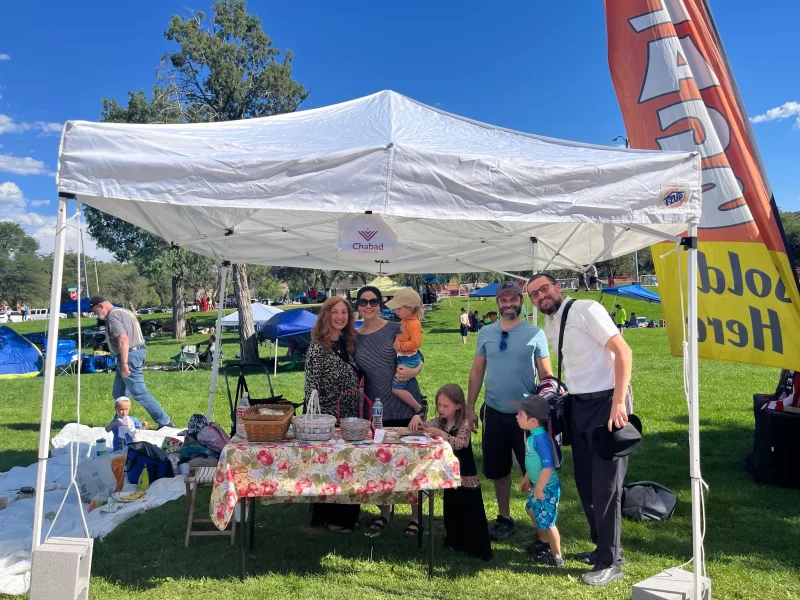
New Roving Chabad Brings Jewish Tradition to Rural Arizona
by Ellen Braunstein – chabad.org
Eastern Arizona is home to cool mountain lakes, lofty buttes, towering cliffs and turquoise skies. And there are some Jews there, as well—although not nearly as numerous as the ponderosa pine trees that the region is famous for.
That doesn’t deter Rabbi Yaakov and Tiferes Cahnman. As a roving Chabad emissary couple, they are being charged with reaching out to Jewish residents and tourists living and visiting anywhere in the state’s vast Rim Country and White Mountains region.
Rabbi Zalman Levertov, who directs Chabad-Lubavitch of Arizona with his wife, Tziporah, was instrumental in paving the way for the young couple to establish Chabad of NE Rural Arizona.
“Traveling long distances just to help a fellow Jew has been the hallmark of the Chabad movement for decades,” said Levertov, who has directed Chabad activities in the state for 47 years. “No Jew should be left behind. That’s our philosophy. We should reach out to every Jew everywhere.”
The population of Arizona is 7.3 million, making it the 14th most populous state in the U.S. However, only 10 percent of the state’s population choose to call its vast rural corridor home.
Until this point, the Jews in rural Arizona have been served by temporary “Roving Rabbis” sent by Chabad, who, during holiday seasons and in the summer, would travel great distances visiting Jews there. A Chabad center dedicated to reaching out to Jews in rural areas was pioneered decades ago by Chabad of RARA in Australia, and in recent years has been replicated in Georgia and Texas.
“Jews throughout the region have expressed the need for more Jewish, Torah-based programming,” Tiferes said. “We hope that by being here with them, we can impart Jewish values and enable anyone who is interested to engage closer with their Judaism.”
The Cahnmans and their three children, Menucha, 7; Moishe, 4; and Geula, 5 months, have made their home in Scottsdale, from which they venture out to various parts of Rim Country and the White Mountains. They have already held a Purim party and barbecue, and distributed matzah to Jewish families for Passover. They are organizing classes and are already planning to host a Shabbaton.
“It’s been an absolute blessing,” said Jeffrey Lesnick, a Jewish retiree who lives in Rim Country’s Payson, where the regular population of 16,000 doubles in the summer months. “It’s really been nice to start reconnecting.”

A Wide Operating Radius
Some places that the Cahnmans service are so rural that houses sit on 20 to 50 acre lots and driving between them can take time. “You can see the horizon in all four directions,” Rabbi Cahnman explained. “It’s a very humbling experience. You can feel G‑d’s presence here.”
The couple sometimes rent a house when they visit far-flung locals but have also been invited to stay with generous people in the community. “We’re operating on a slightly nomadic level at the very outset because we’re still in the early stages of this operation,” the rabbi said.
The Cahnmans spread their message through social media and a weekly column he writes for the White Mountain newspaper. According to the rabbi, many people reached out after they read his pieces, many saying they had no idea that they weren’t the only Jews in the area.
“For the first two years I lived here, I thought I was the only Jew in the entire White Mountain area,” said Suzanne Miles of Show Low (population 12,000) on Northern Arizona’s Mogollon Rim. “Through Rabbi Yaakov, we found out that there are several Jewish people up here. So now, I don’t feel isolated, like I’m the only Jewish person here. It’s just made a world of difference.”
But it’s not just being aware they are not alone. Suzanne invited the rabbi to her home to affix kosher mezuzahs on her door posts. “He spent a few hours here. It was a huge blessing,” she said.
The rabbi added: “You’re really able to help people reconnect with their Judaism. You send the message that your spiritual connection is not diminished by physical distance from Jewish infrastructure.”
A Light Unto All
The response to their efforts has at times been unexpected. For example, the rabbi recently received a text from an elderly man in the White Mountains area, who was raised Jewish in the Bronx and had a negative Hebrew school experience. Consequently, though he considered himself a spiritual Jew, he had never again attended a synagogue.
“I contact you to let you know that I support your efforts,” he texted the couple, noting he looked forward to attending events.
The Cahnmans now have a database of more than 100 Jews, and the list is growing. At a recent event, about a dozen people attended, some driving 45 minutes just to take part.
Preparing for such events can be a logistical challenge. In the case of an event they hosted in Pinetop-Lakeside, a sleepy town nearly 200 miles from Phoenix, the Cahnmans brought in their own pots and pans and prepared kosher food there.
Tiferes Cahnman says that while their mission can sometimes feel like a new frontier, she has had a great support network of emissaries in similar rural locales. She is on a WhatsApp group with nine other women Chabad emissaries focused on rural areas, one of whom is in Ukraine.
“We feel we have a unique responsibility,” said Tiferes. “We want to show every Jew that they’re loved, and no matter what they’ve gone through, or how far they might be, they have a beautiful soul. Neither physical nor spiritual distance can diminish the essence and the holiness of every single soul.”











